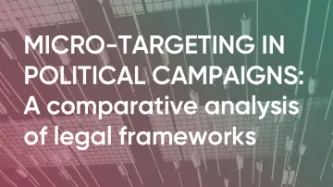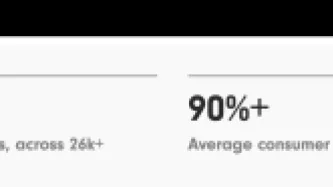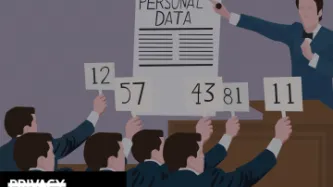Search
Content type: Long Read
Legal regimes governing situations of armed conflict and peace time have traditionally been clearly defined, leaving little to no doubt as to which regime applies to what situation. However, the Militarisation of Tech challenges this tidy distinction. Instead we are seeing the blurring of lines between actors, technologies, and the areas of deployment, financing, export, and regulations of certain technologies. This growing overlap between on the ground and remote, between war and peace,…
Content type: Explainer
An array of digital technologies are being deployed in the context of border enforcement. Satellite and aerial surveillance are part of the surveillance toolkit and yet, they are also used by organisations seeking to hold government actions to account and improve efficacy of their own work. To effectively critique state use and delve into potential benefits of satellite and aerial surveillance, we must first understand it.
In this explainer we dig into a technology which many are aware of for…
Content type: Long Read
The Grand Chamber of the European Court of Human Rights ruled that the UK government’s historical mass interception program violates the rights to privacy and freedom of expression. The Court held that the program “did not contain sufficient “end-to-end” safeguards to provide adequate and effective guarantees against arbitrariness and the risk of abuse.” As a result the Court ruled that UK law "did not meet the “quality of law” requirement and was therefore incapable of keeping the “…
Content type: Examples
Article extract:
"French laws designed to prohibit individual-level targeting are circumvented by services like those provided by Paris-based firm Liegey Muller Pons, which aggregates personal data. Such services are no less data-intensive than those unconstrained by such legal requirements."
"• Liegey Muller Pons (LMP) is a digital campaigning firm that has provided services to over 1,000 campaigns across six European countries. French law prohibits individual-level targeting except under…
Content type: Examples
Article extract- translated from the original French.
"A political big data company with close ties to the federal liberals and which worked on Emmanuel Macron's campaign in France is setting up its head office in Old Montreal to continue its growth and take advantage of Montreal's digital vitality.
Data Sciences inc. (DS) was born from the victory of the Liberal Party of Canada (PLC) in the last election. Tom Pitfield, a close friend of Justin Trudeau, was leading digital operations during…
Content type: Report
This paper examines the various legal frameworks governing micro-targeting in political campaigns in six states: Canada, Brazil, France, Italy, Spain and the UK. It aims to assess national practices as well as point out gaps in their respective frameworks. The paper commences by examining how micro-targeting is defined and thereafter examines the legal provisions applicable to micro-targeting activities.
To do this in an accessible way, the paper follows and analyses the series of activities…
Content type: Examples
By the end of its first three weeks of availability, the French contact tracing app, “StopCovid”, had seen 1.9 million downloads. Of these, only 68 people had entered a positive COVID-19 test result, and only 14 were notified that they might have been exposed, according to the French junior minister for digital affairs, Cédric O. He attributed the app’s uninstallation by 460,000 people to a “decline in concern” about the epidemic in France.
https://www.politico.eu/article/french-contact-…
Content type: Examples
A new requirement to wear wear masks in public in order to curb the spread of the coronavirus poses a problem in France and Belgium, where laws prohibit wearing face coverings, with health as the only allowed exception.
In France, where the law was passed in 2010, between 2011 and 2017 1,830 Muslim women were fined for wearing veils and 145 were warned. The law does not state how to distinguish when face coverings are worn for health reasons rather than religious belief.
This leaves…
Content type: Examples
France has been testing AI tools with security cameras supplied by the French technology company Datakalab in the Paris Metro system and buses in Cannes to detect the percentage of passengers who are wearing face masks. The system does not store or disseminate images and is intended to help authorities anticipate future oubreaks.
https://www.theguardian.com/world/2020/jun/18/coronavirus-mass-surveillance-could-be-here-to-stay-tracking
Writer: Oliver Holmes, Justin McCurry, and Michael Safi…
Content type: Examples
The French data protection authority, CNIL, has examined the French contact tracing app and ruled that it is not fully compliant with the provisions of GDPR and the French data protection law. CNIL’s primary complaint was that the app transferred the news that a user had been infected to all their contacts, not just those who had been in recent proximity, and the privacy policy was insufficiently specific about the categories of data that were being processed and its recipients. Finally, the…
Content type: Examples
All migrants arriving in the UK since June have been ordered to quarantine, but a Border Force source said that little is being done to ensure the rules are followed and some in emergency accommodation are being given vouchers to go to the shops.
Thousands of British tourists returning from France are now being forced to self-isolate for 14 days whilst those it is understood that some of those crossing the Channel on small boats migrants are still going shopping for food.
The Home Office…
Content type: Examples
The Manchester-based cybersecurity company VST Enterprises is working a digital health company Circle Pass Enterprises to create the “Covi-pass” digital health passport intended to allow holders to work and travel safely. The Covi-pass uses a colour system of red, green, and amber to indicate whether the holder has tested positive or negative for the coronavirus, and holds other key information such as name, address, and age, plus a biometric. Despite the challenge of sourcing enough…
Content type: Examples
La Quadrature du Net and La Ligue des Droits de l’Homme have won a ruling from the Conseil d’État, France’s highest administration court, making drones equipped with cameras and flying low enough to detect individuals by their clothing or a distinctive sign illegal. During the lockdown, French police having been using hundreds of drones to monitor and capture images of people in the stret who may not be respecting the lockdown rules, as well as to broadcast audio sanitation instructions.…
Content type: Examples
By the end of March 2021 Eurostar will roll out a facial verification system in which passengers will send a scan of their passport and a selfie so that when boarding they can prove their identity by walking through a camera-lined “biometric” corridor instead of presenting their documents. The Department for Transport is funding the system as part of a £9.4 million competition to revolutionise rail travel and is being developed by the British company iProov in partnership with Eurostar and the…
Content type: Examples
The lives of residents in French and Scottish nursing homes have been put in danger by the homes’ use of Dahua and Hikvision fever scanning cameras. The homes are violating ISO standards for such cameras: they have been incorrectly installed in front of large windowed doors, the staff are not given sufficient time to acclimate after coming in from outdoors, and the cameras deliver incorrect readings when the forehead is obscured by hair or a hat.
https://ipvm.com/reports/hikua-nursing
Writer:…
Content type: Examples
As part of their preparations to ease the lockdown, French authorities have added AI tools into the CCTV cameras in the Paris Metro to detect the number of passengers who are wearing face masks. The system is also being used in outdoor markets and buses in Cannes. Although it is mandatory to wear a mask on public transport in France, the software won't be used to identify, rebuke, or fine people, and the system has not proved as contentious as contact tracing. The data protection regulator CNIL…
Content type: Examples
France, like the UK, opted to develop its own contact tracing app. "StopCovid", using a centralised design developed by the Pan-European Privacy-Preserving Proxity Tracing (PEPP-PT) group, which created a framework called ROBust and the privacy-presERving proximity Tracing protocol (ROBERT). French ministers have defended the decision to choose ROBERT rather than the decentralised options, DP3T or Apple's and Google's jointly developed API, saying that the app is not intended to monitor…
Content type: Examples
As part of a survey of the human rights compliance of contact tracing apps Amnesty International's Security Lab discovered that security vulnerabilities in Qatar's mandatory contact tracing app, EHTERAZ, would have allowed attackers to access the personal information, including name, national ID, health status, and location data, of the app's more than 1 million users because the central server did not have security measures in place to protect the data. The authorities fixed the problem within…
Content type: Examples
The lower house of the French parliament paved the way for the launch of the government's independently-developed contact tracing app. The minister in charge, technology minister Cedric O, praised the app, developed by companies such as Orange and Dassault Systemes, as a French project "with the excellence but also the panache and some would say the stubbornness which characterises our country". O added that although 22 other countries have opted to use the Google/Apple platform, it was not a…
Content type: Examples
The French government asked Apple to change the way its phones handle Bluetooth in order to accommodate the design of its contact tracing app. Downloading and installing the app will be voluntary, but the app will use a centralised design in which the data will be fed into a government server for processing.
Source: https://www.zdnet.com/article/france-asks-apple-to-relax-iphone-security-for-coronavirus-tracking-app-development/
Writer: Charlie Osborne
Publication: ZDNet
Content type: Long Read
Covid Apps are on their way to a phone near you. Is it another case of tech-solutionism or a key tool in our healthcare response to the pandemic? It’s fair to say that nobody quite knows just yet.
We’ve been tracking these apps since the early days. We’ve been monitoring Apple and Google closely, have been involved in the UK’s app process, our partners in Chile and Peru have been tracking their governments’ apps, and more.
Of course privacy concerns arise. But only a simplistic analysis would…
Content type: Examples
With more than 71,000 Serbian citizens returning to the country, primarily from Germany, Austria, Italy, and France, the government has introduced systems to ensure they obey the country's self-isolation rules. The government monitors telephone numbers, especially Italian ones, and pays special attention to communities with a large influx of people from elsewhere.
https://advox.globalvoices.org/2020/03/30/covid-19-pandemic-adversely-affects-digital-rights-in-the-balkans/#
Source: https…
Content type: Examples
The French telecom operator Orange is repurposing its 2013 Flux Vision, which allowed cities and tourist destinations to see their visitors' travel flows, to answer European Commissioner Thierry Breton's call for the EU's mobile operators to provide their location data to fight the pandemic through population monitoring. The French data protection regulator, CNIL, is suggesting that the data is anonymised and therefore legal to use. However, in order to provide the service Orange must first…
Content type: Examples
Managed from a purpose-built coronavirus control centre, Moscow's network of 100,000 cameras equipped with facial recognition technology is being used to ensure that anyone placed under quarantine stays off the streets. Officials claim the centre can also be used to track international arrivals and monitor social media for misinformation.
Source: https://www.france24.com/en/20200324-100-000-cameras-moscow-uses-facial-recognition-to-enforce-quarantine
Writer: Sam Ball
Publication: France 24
Content type: Examples
Facebook's scientists are analysing location data about compliance with social distancing recommendations in various countries using information from a private vault of location information its apps have collected. The analysis shows that only "very modest" changes in habits in the US, France, and the UK, and much more substantial change in Spain and Italy between mid-February and mid-March. Other companies such as Google and Apple, may also be able to contribute insights into public behaviour…
Content type: Examples
In January 2019 the UK Home Office announced it would collaborate with France to overhaul its regime for suspicious activity reports in order to fight money laundering. In 2018, the number of SARs filed with the National Crime Agency rose by 10% to nearly 464,000. Banks, financial services, lawyers, accountants, and estate agents are all obliged to file SARs if they suspect a person or organisation is involved in money laundering, terrorist finance, or other suspicious activity. The system has…
Content type: Examples
Privacy International has filed complaints against seven data brokers (Acxiom, Oracle), ad-tech companies (Criteo, Quantcast, Tapad), and credit referencing agencies (Equifax, Experian) with data protection authorities in France, Ireland, and the UK. It’s been more than five months since the EU’s General Data Protection Regulation (GDPR) came into effect. Fundamentally, the GDPR strengthens rights of individuals with regard to the protection of their data, imposes more stringent…








